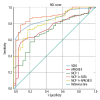Association Between Plasma Levels of Monocyte Chemoattractant Protein-1 (MCP-1) and 28-Day Mortality in Elderly Patients with Sepsis: A Retrospective Single-Center Study
- PMID: 38169464
- PMCID: PMC10773152
- DOI: 10.12659/MSM.942079
Association Between Plasma Levels of Monocyte Chemoattractant Protein-1 (MCP-1) and 28-Day Mortality in Elderly Patients with Sepsis: A Retrospective Single-Center Study
Abstract
BACKGROUND Previous studies have identified an association between plasma levels of the inflammatory cytokine, monocyte chemoattractant protein-1 (MCP-1), and outcomes for patients with sepsis. This retrospective single-center study assessed the association between plasma levels of MCP-1 and 28-day mortality in 136 patients ≥65 years diagnosed with sepsis between October 2020 and October 2021. MATERIAL AND METHODS The objective was to compare and analyze the parameters in the survival group (n=35) and the 28-day mortality group (n=101), including Sequential Organ Failure Assessment (SOFA), Acute Physiology and Chronic Health Evaluation II (APACHE II), plasma MCP-1, and laboratory test results. Plasma MCP-1 was quantified by cytokine test kit (LKTM014B, R&D). Statistical analysis was carried out in SPSS 26.0 and MedCalc 92.1.0 software. RESULTS The 28-day mortality group exhibited higher levels of SOFA, APACHEII, and plasma MCP-1 (all P<0.001), as well as lower levels of albumin, compared to the survival group (P<0.05). The logistic regression analysis findings indicated that SOFA, APACHEII, plasma MCP-1, and SBP are all independent risk factors for 28-day mortality. The area under the curve for SOFA, APACHEII, MCP-1, MCP-1+ SOFA, and MCP-1+APACHEII were 0.845, 0.744, 0.712, 0.879, and 0.822, respectively. MCP-1+SOFA exhibited higher sensitivity than SOFA alone. Furthermore, the assessment values of plasma MCP-1 combined with SOFA were superior to those of APACHE II or plasma MCP-1 (Z₁=2.661, Z₂=3.272, both P<0.01). CONCLUSIONS The findings from this study from a single center support those of previous studies that increased plasma levels of MCP-1 are significantly associated with 28-day mortality in patients with sepsis.
Conflict of interest statement
Figures

Similar articles
-
[Comparison of simplified acute physiology score III and other scoring systems in prediction of 28-day prognosis in patients with severe sepsis].Zhonghua Wei Zhong Bing Ji Jiu Yi Xue. 2015 Jun;27(6):454-9. doi: 10.3760/cma.j.issn.2095-4352.2015.06.008. Zhonghua Wei Zhong Bing Ji Jiu Yi Xue. 2015. PMID: 26049183 Chinese.
-
[Diagnostic accuracy of muscle ultrasound and plasma monocyte chemoattractant protein-1 for ICU-acquired weakness in patients with sepsis].Zhonghua Wei Zhong Bing Ji Jiu Yi Xue. 2022 Jan;34(1):12-17. doi: 10.3760/cma.j.cn121430-20211021-01531. Zhonghua Wei Zhong Bing Ji Jiu Yi Xue. 2022. PMID: 35307054 Chinese.
-
[Clinical value of serum endocan and procalcitonin in early diagnosis and prognosis evaluation of sepsis].Zhonghua Wei Zhong Bing Ji Jiu Yi Xue. 2017 Apr;29(4):321-326. doi: 10.3760/cma.j.issn.2095-4352.2017.04.007. Zhonghua Wei Zhong Bing Ji Jiu Yi Xue. 2017. PMID: 28420465 Chinese.
-
[A multicenter confirmatory study about precision and practicability of Sepsis-3].Zhonghua Wei Zhong Bing Ji Jiu Yi Xue. 2017 Feb;29(2):99-105. doi: 10.3760/cma.j.issn.2095-4352.2017.02.002. Zhonghua Wei Zhong Bing Ji Jiu Yi Xue. 2017. PMID: 28625254 Chinese.
-
[Prognostic value of coagulation function combined with acute physiology and chronic health evaluation II and sequential organ failure assessment scores for patients with bloodstream infection].Zhonghua Wei Zhong Bing Ji Jiu Yi Xue. 2021 Dec;33(12):1434-1439. doi: 10.3760/cma.j.cn121430-20210910-01361. Zhonghua Wei Zhong Bing Ji Jiu Yi Xue. 2021. PMID: 35131009 Chinese.
Cited by
-
A bidirectional mendelian-randomization analyses of genetically predicted circulating levels of systemic inflammatory regulators with risk of sepsis.Medicine (Baltimore). 2025 Apr 25;104(17):e42199. doi: 10.1097/MD.0000000000042199. Medicine (Baltimore). 2025. PMID: 40295284 Free PMC article.
-
Targeting Inflammation After Hemorrhagic Shock as a Molecular and Experimental Journey to Improve Outcomes: A Review.Cureus. 2025 Jan 21;17(1):e77776. doi: 10.7759/cureus.77776. eCollection 2025 Jan. Cureus. 2025. PMID: 39981454 Free PMC article. Review.
References
MeSH terms
Substances
LinkOut - more resources
Full Text Sources
Medical
Research Materials
Miscellaneous

